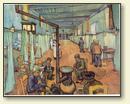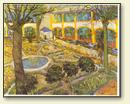| Relevant paintings: 
"Ward in the Hospital in Arles," Vincent van Gogh
[Enlarge]

"Courtyard of the Hospital at Arles," Vincent van Gogh
[Enlarge]
|
Letter W111
Arles, 30 April 1889
My dear sister,
Your letter affected me above all because I learned from it
that you have returned in order to nurse Mme. Duquesne.
Cancer is certainly a terrible disease - as for me, I always
tremble when I see a case of it - and this is no rare
occurrence in the South, though it is often not the real,
incurable and mortal cancer, but cancerous tumors from which
people occasionally recover. However this may be, I think it
very brave of you, Sister, not to shrink from this Gethsamane.
I feel I am less brave than you, when I think of such things,
for I feel clumsy, unwieldy, awkward in their presence. If my
memory does not deceive me, we have a Dutch proverb bearing on
this - They are not the worst fruits that wasps gnaw at
…
This leads me straight to what I wanted to say. The ivy
loves the old branchless willow - every spring the ivy loves
the trunk of the old oak tree - and in the same way cancer,
that mysterious plant, so often fastens on people whose lives
were nothing but love and devotion. However terrible the
mystery of these sufferings may be, yet there is in reality
something sweet and pathetically touching about it, which has
the same effect as seeing the abundant growth of green moss on
the old thatched roof. All the same I know nothing about it,
and I haven't the right to assert anything.
Not very far from here there is an old, old tomb, much older
than Christ's sepulcher, bearing the following inscription:
“Blessed be Thebe, daughter of Telhui, priestess of
Osiris, who never complained of anyone.” I could not help
thinking of this when you told me that the patient you are
nursing never complains …
Mother will doubtless be pleased with Theo's marriage, and
he writes me that she seems to be getting younger in
appearance. This pleases me very much indeed. Now he too is
very contented with his experience of matrimony, and feels
considerably reassured. He has very few illusions about it all,
for he possesses to a rare degree that strength of mind which
enables him to take things as they are without expressing
himself about the good or the bad of them. And he is quite
right in this, for what do we know about what we are doing?
As for myself, I am going to an asylum in St.
Rémy, not far from here, for three months.
Well, this is bad enough, the fact is that I have been much
calmer since then, and that I am perfectly well physically. I
still feel incapable of taking a new studio. Notwithstanding
this I am working, and have just finished two pictures of the
hospital, one of a ward, a very long ward, with rows of beds
with white curtains, in which some figures of patients are
moving. The walls, the ceiling with big beams, all in white,
lilac-white or green-white. Here and there a window with a pink
or bright green curtain. The floor paved with red bricks. At
the end a door with a crucifix over it. It is all very, very
simple. And then, as a pendant, the inner
court. It is an arcaded gallery like those one finds in Arab
buildings, all white-washed. In front of those galleries an
antique garden with a pond in the middle, and eight flower
beds, forget-me-nots, Christmas roses, anemones, ranunculus,
wallflowers, daisies, and so on. And under the gallery orange
trees and oleander. So it is a picture quite
full of flowers and vernal green. However, three gloomy black
tree trunks pass through it like serpents, and in the
foreground four big dismal clusters of somber box shrub. It is
probable that people here won't see very much in it, but
nevertheless it has always been my great desire to paint for
those who do not know the artistic aspect of a picture.
What shall I say? You don't know the arguments of the good
Father Pangloss in Voltaire's Candide, nor do you know
Flaubert's Bouvard and Pécuchet.2 These
are books written by men for men, and I don't know whether
women can understand them. But the memory of them often
sustains me in the hours and days and nights that are hardly
easy or enviable.
I have reread Uncle Tom's Cabin by Beecher Stowe with
extreme attention, for the very reason that it is a book
written by a woman, written, as she tells us, while she was
making soup for the children - and after that, also with
extreme attention, Charles Dickens's Christmas Tales.
I read a little in order to meditate all the more. It is
very probable that I shall have to suffer a great deal yet. And
to tell the honest truth, this does not suit me at all, for
under no circumstances do I long for a martyr's career. For I
have always sought something different from heroism, which I do
not have, which I certainly admire in others, but which, I tell
you again, I consider neither my duty nor my ideal.
I haven't reread the excellent books by Renan, but how often
I think of them here, where we have olive trees and other
characteristic plants, and the blue sky …
Oh, how right Renan is, and how beautiful that work of his,
in which he speaks to us in a French that nobody else speaks. A
French that contains, in the sound of the words, the
blue sky, the soft rustling of the olive trees, and finally a
thousand true and explanatory things which give his
History the character of a Resurrection. One of the saddest
things I know is that prejudice of people who in their
self-conceit oppose so many good and beautiful things which
were created in our own time. Ah, the eternal
“ignorance,” the eternal misunderstandings - and
how much good it does one to come across a word which is really
serene …
Blessed be Thebe, daughter of Telhui, priestess of Osiris,
who never complained of anyone.
As for me, I am rather often uneasy in my mind, because I
think that my life has not been calm enough; all those bitter
disappointments, adversities, changes keep me from developing
fully and naturally in my artistic career.
“A rolling stone gathers no moss,” they say,
don't they?
But what does it matter, seeing that, as the above-mentioned
Father Pangloss proves all by himself “[que] tout va pour
le mieux dans le meilleur des mondes.”
Last year I did ten or a dozen orchards in bloom, and this
year I have done only four, so the work doesn't go very
vigorously.
If you have the book by Drône which you speak
about I should like very much to read it, but do me the favour
of not buying it expressly for me at the present moment.
I have seen very interesting nuns here, but the majority of the
priests seem to be in a wretched state. I have been so afraid
of religion for many years. For instance, do you happen to know
that love may not exist in the way people imagine? - the
resident physician here, the worthiest man you could possibly
imagine to yourself, the most devoted, the most courageous, a
warm and manly heart, amuses himself now and then by mystifying
the good women here by telling them that love is a microbe. And
when on hearing this the good women and even some men raise a
loud outcry, he doesn't care a rap, and remains imperturbable
on this point. And as regards kissing, all the other things we
like to do in addition, these are only actions of a natural order,
like drinking a glass of water or eating a slice of bread.
Certainly kissing is rather indispensable, otherwise serious
disorders might result. Now must the intellectual sympathies
always go with or without what went on previously? Why regulate
all this, what is the good of it?
As far as I'm concerned, I won't dispute that love is a
microbe, and notwithstanding this it would not prevent one from
feeling something like respect in the face of the sufferings
caused by cancer, for instance.
And look here, the doctors, who you say cannot do very much
now and then, which you are at liberty to say as often as you
think proper - very well - but do you know what they can do
nevertheless? - they can press your hand more cordially and
more gently than many other people can, and their presence may
at times be very sympathetic and reassuring.
Look here, very often I let myself talk on and on, and yet I
cannot write two lines, and I am much afraid that this time too
my ideas are futile and incoherent.
Only in any case I wanted to write you a letter which you
would receive while you're there.
I look upon the whole thing as a simple accident.
Every day I take the remedy which the incomparable Dickens
prescribes against suicide. It consists of a glass of wine, a
piece of bread with cheese and a pipe of tobacco. This is not
complicated, you will tell me, and you will hardly be able to
believe that this is the limit to which melancholy will take
me; all the same, at some moments - oh dear me …
Well, it is not always pleasant, but I do my best not to
forget altogether how to make contemptuous fun of it. I try to
avoid everything that has any connection with heroism or
martyrdom; in short, I do my best not to take lugubrious things
lugubriously.
Now I wish you good night, and my kind regards to your
patient, though I do not know her.
All yours, Vincent
I do not know whether Lies is at Soesterberg at the moment;
if she is there, remember me most kindly to her.
-
Written in French.
-
See letter 588 to Theo.
At this time, Vincent was 36 year oldSource:
Vincent van Gogh. Letter to Wilhelmina van Gogh. Written 30 April 1889 in Arles. Translated by Mrs. Johanna van Gogh-Bonger, edited by Robert Harrison, number W11.
URL: https://www.webexhibits.org/vangogh/letter/19/W11.htm.
This letter may be freely used, in accordance with the terms of this site.
|